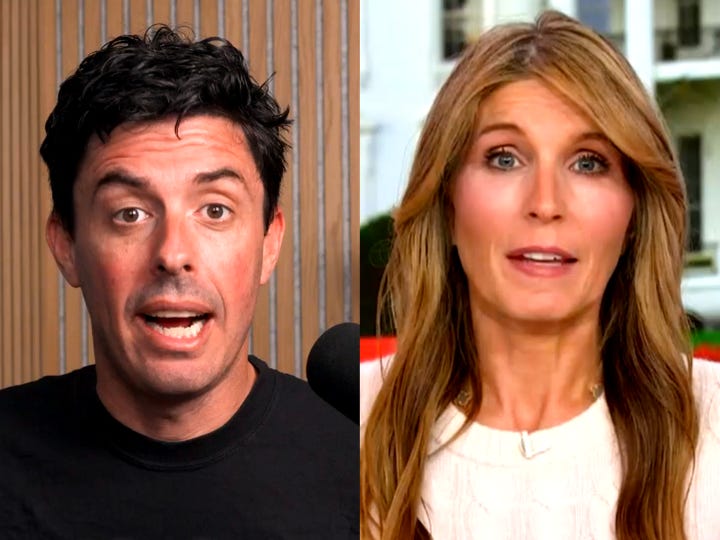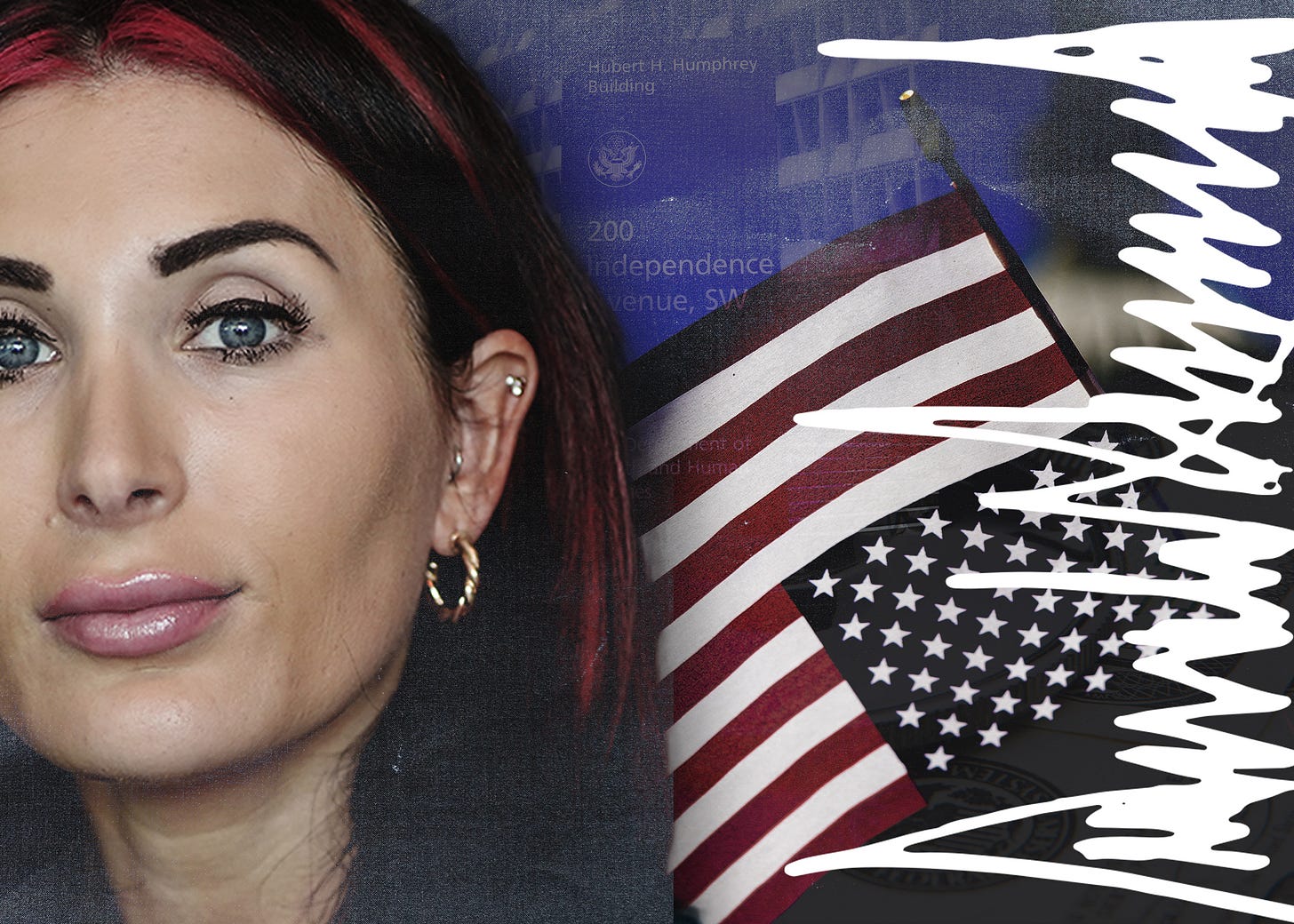
Right-Wing Militia’s Wild Plot to Destroy the Weather System
May 6, 2025
Trump’s Lies Exposed by His Own Administration
May 6, 2025THE INTERNAL REPUBLICAN FIGHT over potential Medicaid cuts has gotten so intense that even Laura Loomer is getting involved.
On Monday night, the MAGA influencer known for white nationalist rhetoric and conspiracy theories posted more than four hundred words on X defending Medicaid, the government insurance program that pays medical bills for more than 70 million mostly low-income Americans.
Medicaid’s future has been a topic of debate for months, with Republican leaders in Congress proposing reductions to the program to offset the cost of tax cuts Trump wants to pass in his “big, beautiful bill.” Negotiations over whether and how to make this happen are taking place on Capitol Hill right now, with a goal of passing final legislation sometime in the mid- to late summer.
But it’s been a slog. The House committee crafting Medicaid cuts has already pushed its work back a week—“they haven’t worked out the numbers, they still aren’t on the same page,” one GOP lobbyist told me on Tuesday.
That’s mainly because so many Republican lawmakers are antsy about the effects big cuts might have on their constituents—and, by extension, their future electoral prospects. Loomer, in her Monday-night tweet, said they are right to worry.
Medicaid is “critical to the heartland voters who propelled Donald Trump to his election victories,” she wrote, before warning that cuts could hit “Americans the hardest in rural red states like Texas, Florida, and Louisiana, where Trump’s base depends on the Medicaid program for survival.”
In prior times, Loomer’s opinions would not carry much weight with congressional Republicans, especially on social welfare programs. But she’s proven influential over the past few months, including when she evidently persuaded Trump to fire a half dozen National Security Council staffers last month.
And her decision to warn lawmakers against Medicaid cuts wasn’t just an attempt to distill and explain Trumpism’s appeal to voters. It was also a direct attack on a particular strand of conservative intellectualism—and a particular conservative intellectual named Brian Blase, who as president of the right-wing Paragon Health Institute has been making the case for big Medicaid cuts for years.
In the tweet, Loomer called Blase a “RINO Saboteur” and “covert Never-Trumper masquerading as a MAGA loyalist.” She warned that he was “spearheading a dangerous campaign to undermine the Republican Party’s midterm prospects.” For good measure, she accused him of “treachery.”
The idea of Blase as a disloyal RINO is difficult to square with his actual record, which includes service as a top adviser in Trump’s first administration and relentless criticism of Democratic health policies like Obamacare. “I am proud to have served President Trump for two and a half years at the White House,” Blase told me in a phone interview Tuesday night.
But Loomer’s arguments about the political impacts of Medicaid cuts are consistent with what many analysts have been saying, and she is hardly the first high-profile figure in Trump’s circles to air them.
Former top Trump strategist Steve Bannon has been sounding alarms since February, when he told a Fox interviewer that “a lot of MAGAs” are on Medicaid. “If you don’t think so, you’re dead wrong. . . . You can’t just take a meat axe to it.”
Trump’s polling firm later backed up that intuition with survey results showing Medicaid cuts to be unpopular with a majority of Trump supporters. “There’s really not a political appetite out there to go after Medicaid to pay for tax cuts,” Bob Ward, a partner with the firm Fabrizio Ward, told Politico. “Medicaid has touched so many families that people have made up their minds about what they don’t want to see cut.”
Trump himself has said he is going to protect Medicaid—although, as is always the case, it’s hard to know exactly what he means, how seriously he means it, or how much thought he has even given to the matter.
But Trump’s own uncertainty here is telling, just like the pushback to Medicaid cuts from the likes of Loomer. Together they are a sign of just how much the politics around government health care programs has changed in the last few years—and why this piece of Trump’s big, beautiful bill is proving so tough to pass.
FOR MOST OF MEDICAID’S EXISTENCE, you had to go to the Democratic party—and, frequently, the more liberal wing of the Democratic party—to find such stirring defenses of the program. Over on the Republican side, the conversation was all about scaling back Medicaid and turning much more responsibility for it over to the states, which currently administer the program but on average cover only about one-third of its costs.
Open, enthusiastic calls to slash Medicaid were a fixture of Republican politics as recently as 2017, at the start of Trump’s first term, when proposals to overhaul the entire program were part of legislation that sought to repeal the Affordable Care Act. But the proposal proved highly unpopular, leading to its failure, partly because expansions of Medicaid under Obamacare meant that many more people were getting insurance through the program—and, as a result, had more to lose from the cuts Republicans had in mind.
Republicans paid a deep political price simply for pursuing repeal: Over the course of the next two elections, the backlash helped Democrats get back control of the government. With those scars still fresh, Republicans have lowered their ambitions somewhat and reframed their arguments, saying they are interested in cutting only “waste, fraud, and abuse” while—in their words—“protecting the vulnerable.”
But those terms are still quite broad—they’re more slogans than policy plans—and individual Republicans have used them to mean anything from requiring Medicaid enrollees to re-establish their eligibility more frequently to adding “work requirements” to dialing back federal support. Each proposed reform has its own variations, and its own arguments for or against it. More modest versions already seem to have broad support, probably enough to get through Congress.
The question now is whether Republicans can get behind more ambitious versions, enough to generate the kind of savings GOP leaders have in mind—somewhere between $800 and $900 billion over ten years. That would likely require making it a lot more difficult for people to get on and stay on Medicaid, or shifting much more financial responsibility onto states, or both.
The result would almost certainly be big coverage losses, the same kind that were hard to stomach back in 2017. And the politics back then were probably easier, given that in the interim nine politically divided or Republican-leaning states have adopted the Affordable Care Act’s Medicaid expansion, adding yet more people to the program.
That’s on top of the work Medicaid was already doing underwriting services and hospitals in rural areas, not to mention the associated jobs and economic activity. That includes the rural parts of blue states like New York and California whose elected representatives in the House are more than enough to account for the GOP majority there.
The importance of Medicaid to these states and regions isn’t just a byproduct of Medicaid growth. It’s also a byproduct of how the Republican coalition has evolved, with lower-income voters (especially white lower-income voters) making up a larger and more influential part of the party.
These are the MAGA voters whom Bannon and Loomer have in mind—and whom Republicans, including Trump, are quite understandably wary of alienating.
Among those who may understand the challenge is Blase. In a Monday Wall Street Journal op-ed, he promoted Medicaid cuts to Trump and Republicans by channeling familiar MAGA themes and framing the agenda as a way to wreck what he called the Democratic “political machine.”
Studies show Medicaid enrollment boosts voter turnout, especially in Democratic areas. Enrolling in Medicaid traps recipients in a welfare program, links them to nonprofits offering voter registration, and places them squarely in the sights of campaigns’ get-out-the-vote efforts. Leftists are so reliant on welfare spending for electoral success that they oppose policies that lift people out of poverty. Expanding Medicaid using federal funds—even to noncitizens through creative financing—can have significant political consequences that Republicans shouldn’t underestimate.
It’s hard to know how persuasive that kind of argument will be. On Tuesday evening, as we were preparing to publish this newsletter, House Speaker Mike Johnson (R-La.) announced some of the biggest cuts under discussion were now off the table, in deference to the concerns of more moderate members.
But that’s no guarantee that versions of those ideas won’t come back onto the table later, as frequently happens in these sorts of negotiations. The core argument of advocates like Blase, that Medicaid has gotten too bloated and uses taxpayer dollars ineffectively, still resonates with lots of Republicans. And they still have leverage too.
THIS FIGHT FOR MAGA’S SOUL will be a big factor in determining how the Medicaid debate turns out. But it won’t be the only one.
Other variables include how the Congressional Budget Office decides to score particular proposals and how effectively liberal defenders of Medicaid can rally their forces. Trust between the two chambers matters too: Nervous House Republicans don’t want to take a politically difficult vote only to have the Senate kill the provision later.
And then there is the role of interest groups with a stake in the fight, including multiple sectors of the health care industry.
But ultimately the outcome may depend on whether Trump decides to push hard for big cuts—which, in turn, may depend on whether he thinks his MAGA supporters will react badly. For that reason alone, it is worth treating Loomer’s tweet seriously, and not merely as the musings of a notorious MAGA gadfly.
Great Job Jonathan Cohn & the Team @ The Bulwark Source link for sharing this story.





